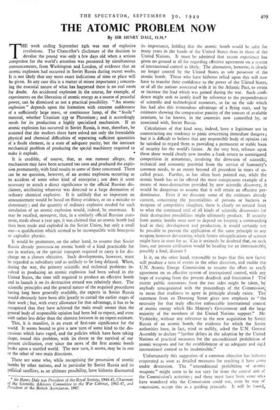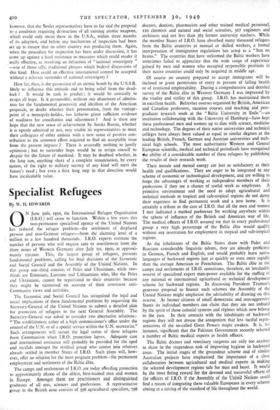THE ATOMIC PROBLEM NOW
By SIR HENRY DALE, O.M.•
THE week ending September 24th was one of explosive revelations. The Chancellor's disclosure of the decision to devalue the pound was only a few days old when a serious competitor for the world's attention was presented by simultaneous announcements, from Washington and London, of evidence that an
atomic explosion had occurred in Soviet Russia during recent weeks.
It is not likely that•any more exact indications of time or place will be given. In any case this is a matter of minor importance ; concern- ing the essential nature of what has happened there is no real room for doubt. An accidental explosion in the course, for example, of experiments on the liberation of atomic energy as a source of peaceful power, can be dismissed as not a practical possibility. " An atomic explosion " depends upon the formation with extreme suddenness of a sufficiently large mass, or continuous lump, of the " fissile " material, whether Uranium 235 or Plutonium ; and it accordingly needs for its production a highly specialised mechanism. If an atomic explosion has occurred in Soviet Russia, it may, therefore, be assumed that the workers there have solved not only the formidable physical and chemical difficulties of separating sufficient quantities of a fissile element, in a state of adequate purity, but the intricate mechanical problem of producing the special machinery required to
make it explode. • It is credible, of course, that, as one rumour alleges, the mechanism may have been actuated too soon and produced the explo- sion prematurely, with fatal results to some of those concerned. There can be no question, however, of an atomic explosion occurring as an accident of some other kind of enterprise ; nor does it seem necessary to attach a direct significance to the official Russian dis- claimer, attributing whatever was detected to a large detonation of ordinary chemical explosive. It is unlikely that so important an announcement would be based on flimsy evidence, or on a mistake so elementary ; and the quantity of ordinary explosive needed for such simulation of an atomic explosion would, indeed, be enormous. It may be recalled, moreover, that, in a similarly official Russian state- ment, nude about a year ago, it was claimed that an atomic bomb had then been made and exploded in the Soviet Union, but only a small one—a qualification which seemed to be incompatible with bourgeois or capitalist physics.
It would be premature, on the other hand, to assume that Soviet Russia already possesses-an atomic bomb of a kind practicable for use in warfare, or the special transport required to carry it for dis- charge on a chosen objective. Such developments, however, must be regarded as subsidiary and as unlikely to be long delayed. When, during the war, the primary scientific and technical problems in- volved in producing an atomic explosion had been solved in the United States, the time still required to produce an effective bomb and to launch it on its destructive errand was relatively short. The scientific principles and the general nature of the required procedures having long been generally available, the experts in Soviet Russia would obviously have been able treacly to curtail the earlier stages of their work ; but, with every allowance for that advantage, it has to be recognised that they have achieved the main result sooner than the general body of responsible opinion had been led to expect, and even with rather less delay than the shortest foreseen in an expert estimate. This, it is manifest, is an event of first-rate significance for the world. It seems bound to give a new turn of some kind to the dis- cussions which have raged, and the policies which have been taking shape, round this problem, with its threat to the survival of our present civilisation, ever since the news of the first atomic bomb broke upon a startled world. The new turn, it seems, may be in one or the other of two main directions.
There are some who, while recognising the possession of atomic bombs by other nations, and in particular by Soviet Russia and its pOlitical satellites, as an ultimate possibility, have hitherto discounted ' Sir Henry Dale was President of the Royal Society, 1940-45, Chairman of the Scientific Advisory Committee to the War Cabinet, 1942-47, and President of the British Association, 1947. its importance, holding that the atomic bomb would be safer for many years in the hands of the United States than in those of the United Nations. It must be admitted that recent experience has given no ground at all for regarding effective agreement on a system of international control as likely. The alternative, however, is clearly no longer control by the United States as sole possessor of tha atomic bomb. Those who have hitherto relied upon this will now have to transfer their confidence to the power of the United States, or of all the nations associated with it in the Atlantic Pact, to retain or increase the lead which was gained during the war. Such confi- dence might seek to justify itself by reference to the preponderance of scientific and technological resources, so far on the side which • has had also this tremendous advantage of a flying start, and by estimates showing the comparative paucity of the sources of available uranium, so far known, in the countries now controlled by, or associated with, Soviet Russia.
Calculations of that kind may, indeed, have a legitimate use in counteracting any tendency to panic concerning immediate dangers ; but it is difficult to believe that any responsible body of opinion can be satisfied to regard them as providing a permanent or stable basis of security for the world's future. At the very best, reliance upon them alone would clearly now involve a frank return to unmitigated competition in armaments, involving the diversion of scientific, technical and economic potential from the service of humanity's common needs, to an extent beyond all precedent in times of so- called peace, Further, as has often been pointed out, while the atomic bomb has so far offered the most conspicuous example of a means of mass-destruction provided by new scientific discovery, it would be dangerous to assume that it will retain an effective pre- dominance. Even if we discount some of the estimates already current, concerning the potentialities of poisons or bacteria as weapons of competitive slaughter, there is clearly no natural limit to what the continued trial of all kinds of scientific discoveries fort their destructive possibilities might ultimately produce. If security, from atomic bombs were now to depend on keeping a commanding lead in their development and production, it would certainly not be possible to prevent the application of the same principle to any weapon; however devastating, which future misapplications of science might have in store for us.' Can it seriously be doubted that, on such lines, our present civilisation would be heading for an immeasurable, possibly a final, disaster ?
Is it, on the other hand, reasonable to hope that this new factor will produce a turn of events in the other direction, and enable the U.N. Atomic Energy Commission to resume the effort to reach agreement on an effective system of international control, with any hope of escaping from the present deadlock and frustration ? The recent public statements from the two sides might be taken, by anybody unacquainted with the proceedings of the Commission, to mean that readiness to agree in principle already exists. The statement from to Downing Street gives new emphasis to " the necessity for that truly effective enforceable international control of atomic energy which His Majesty's Government and the large majority of the members of the United Nations support." Mr, Vyshinsky, without any reference to the new acquisition by Soviet Russia of an atomic bomb, the evidence for which the Soviet authorities have, in fact, tried to nullify, asked the U.N. General Assembly to declare " further delays in the adoption by the United Nations of practical measures for the unconditional prohibition of atomic weapons and for the establishment of an adequate and rigid international control to be inadmissible."
Unfortunately this suggestion of a common objective has hitherto, evaporated as soon as detailed measures for reaching it have coma under discussion, The " unconditional prohibition of atomic weapons" might seem to be not very far from the central aim of the Commission's activities ; and there must have been some who have wondered why the Commission could not, even by way of concession, accept this as a guiding principle. It will be found,
however, that the Soviet representatives have so far tied the proposal to a condition requiring destruction of all existing atomic weapons, which could only mean those in the U.S.A., within three months of its adoption, and before any mechanism of inspection had been set up to ensure that no other country was producing them. Again, when the procedure for inspection has been under discussion, it has come up against a hard resistance to measures which could render it really effective, as involving an infraction of " national sovereignty " —one of those silly, traditional phrases which bedevil discussions of this kind. How could an effective international control be accepted without a relevant surrender of national sovereignty ?
How far, then, is the possession of an atomic bomb by the U.S.S.R. likely to influence this attitude and to bring relief from the dead- lock ? It would be rash to predict ; it would be cowardly to resign all hope. Is it permissible, without any abatement of admira- tion for the fundamental generosity and idealism of the American proposals, to doubt whether their presentation, from the vantage- point of a monopoly-holder, has hitherto given sufficient evidence of readiness for conciliation and adjustment ? And is there any hope that the new sense of achievement by Soviet Russia, whether it is openly admitted or not, may enable its representatives to meet their colleagues of other nations with a new sense of positive con- tribution to the common effort required to find an acceptable issue from the present impasse ? There is assuredly nothing to justify optimism ; but to surrender hope would be to resign oneself to despair for the future of mankind. It may be doubted whether, in the long run, anything short of a complete renunciation, by every nation, of the right to military secrecy of any kind will meet the future's need ; but even a first long step in that direction would have incalculable value.















































 Previous page
Previous page